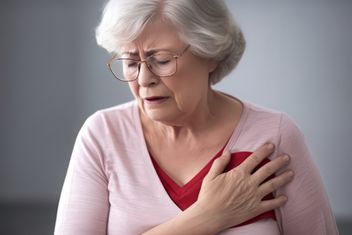Heart Attack Symptoms in Women: What to Look For
January 26, 2022Every year, about 805,000 people in the United States have a heart attack. While heart attacks are common in both men and women, heart attack symptoms in women can differ from those in men. Read on to learn the female-specific symptoms to look out for.

The Inside Rx Blog
Get the Inside Scoop on tips & tricks that may help your family save on prescriptions!
Subscribe to stay up to date with the latest news and tips
When most people think of a heart attack, the first symptom that likely comes to mind is chest pain. Yet, what if there is no chest pain? Could you or a loved one still be experiencing a heart attack?
What if the symptoms are nausea, lightheadedness, shortness of breath, and fatigue? These common symptoms are, in fact, also consistent with a heart attack, though they’re more commonly reported in women.
The problem is many women are unaware that these could be possible byproducts of heart failure, so the warning signs get misinterpreted for something else. This is why cardiac arrest is the leading cause of death for women, despite having the same number of cases as men.
It’s imperative that women take heart failure into account when experiencing these symptoms in conjunction with other risk factors. So here are several of the more subtle but serious heart attack symptoms in women that should prompt seeking immediate medical attention.
1. Nausea and Vomiting
Heart attacks typically occur when a blood clot forms in a coronary artery. That artery is likely already narrowed from plaque deposits built up over many years.
When that artery becomes blocked, the part of the heart that depends on that vessel for oxygen-rich blood is suddenly deprived of vital nutrients, and the heart tissue begins to die.
This can lead to something called cardiogenic vomiting, in which someone becomes nauseous to the point of vomiting, brought on by the toxins released as damaged cardiomyocytes—the cells that make up the heart tissue—die off.

How Prescription Weight Loss Medications Are Evaluated

Why Drug Prices Change and How Discount Cards Help

How to Handle a Drug Price Increase (After Your Plan Resets)

Preparing for 2026: Prescription Savings Trends & Planning Tips
2. Lightheadedness
Although a heart attack occurs at the chest, women often don’t experience symptoms in this area of the body. Instead, while the heart is undergoing oxygen deprivation, other organs elsewhere in the body are being affected.
Since the heart is not able to provide the brain with a sufficient supply of oxygenated blood, women having a heart attack often experience lightheadedness or dizziness.
Compared to premenopausal women, postmenopausal women are at a greater risk of heart attacks because they produce less heart-protective estrogen.
Although lightheadedness or dizziness can be caused by many things, higher-risk groups (like postmenopausal women) should treat it as a serious symptom that needs to be evaluated by a medical professional.
Another vulnerable group for women are those with general heart-related risk factors. This includes anyone with diseases and disorders like:
- Diabetes
- High blood pressure
- Obesity
- High cholesterol
- Tobacco use
3. Fatigue
Although fatigue is hard to pinpoint, it’s a telling symptom of heart disease. Studies have shown that women who have a heart attack can start experiencing an unusual level of fatigue, sometimes occurring several weeks before the onset of the heart attack.
If you’re suddenly exhausted by everyday activities that you used to do with ease, like walking up a flight of stairs, cleaning your home, or shopping for groceries, keep in mind that fatigue can be a sign that your heart isn’t getting all the oxygen it needs.
Women with sudden and unusual fatigue—especially if they have other heart disease risk factors—should seek immediate medical attention that includes a comprehensive cardiac evaluation.
Pantoprazole Sodium
$ 8.04Amlodipine Besylate
$ 10.004. Shortness of Breath
Your lungs and heart work as a team to ensure your cardiopulmonary system supplies the body with enough oxygen-rich blood to function properly.
If your heart is functioning poorly from a shortage of blood flow stemming from a clogged artery, then it won’t be able to contract forcefully enough to push an adequate blood supply to the lungs. When this happens, women experiencing a heart attack often feel shortness of breath because their hearts and lungs are not getting enough oxygen.
Inside Rx Can Help
Heart attack symptoms in women can differ from those that men experience. If you suffer from these symptoms, contact your medical provider. If you have already had a heart attack or experience any other medical conditions, treating your health issue can be expensive. Thankfully, Inside Rx offers a prescription savings card that can provide a discount savings of up to 80% on your prescription medications, including both brand name and generics.
Getting started is as easy as searching your medication to discover all your available discounts. Once you’ve found what you need, just download the free savings card, show it at your local pharmacy and see if you can save!
To learn more about Inside Rx, visit our FAQ page.